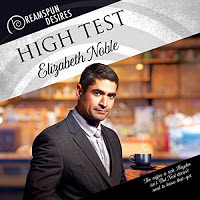My Emphatic Search for Empathy
 This week we hear from our newest narrator, Colin Darcy.
This week we hear from our newest narrator, Colin Darcy.His debut narration, "High Test," by Elizabeth Noble, should hit the spot for cafe goers,with its romance of mistaken identities set against the rich
and steamy backdrop of the gourmet coffee business. Enjoy!
----------------------------------------------------------------------------------------
“We thought you were the gay one,” my mom offered one afternoon, not quite a decade ago. I wished at that moment I had my wife’s ability to raise just one eyebrow. When aimed at me at least, it speaks volumes, and has the innate ability to judge and question at the same time, cutting me to the core. But I can’t raise just one eyebrow, so I was forced to use words, plain and simple, fruitless and ineffective words to to explain to mom that while she has a gay son, and it’s not me, that some families have more than one, and others don’t have a gay child at all. We discussed the various ‘signs’ she missed: the love of musical theater, and fashion, and so, just...so….emotional. Those descriptions however, were all directed toward me, thus explaining the misplaced judgement and excusing my mom’s most recent failed ‘gay-dar’ attempt.
 I’ve always been very emotional. When I was in seventh grade my favorite song was “One Last Cry,”
I’ve always been very emotional. When I was in seventh grade my favorite song was “One Last Cry,”by Brian McKnight. A lot of days it still is my favorite. I was a twelve-year-old kid listening to a man singing about saying goodbye to his lover, until the cassette tape wore thin and stretched and poor Brian sounded like even more of a bumbling crying mess.
I played the trumpet in school and prided myself not on my ability to play the right notes, and in tune, which is a lot to ask, but that I tried to discover what the composer was trying to say, to convey. I tried to empathize with the composer, perhaps Beethoven pressing a deaf ear to his piano as he attempted to compose the sound of his heart breaking for Elise.
I find that as a narrator I find a lot of joy and take a lot of pride in my ability to empathize with the characters. I look forward to exploring the emotionality of each of the characters.
I know I’m going to lose a lot of respect here, but I am not, in any way, a fan of science-fiction or wizards, hobbits, talking foxes, fighting robots, or post apocalyptic epochs. But I can watch or read within those genres because, if they are written well, the characters are as vivid as the landscapes in which they trudge, and as evocatively emotional as the other-worldly circumstances they find themselves in.
I love ‘The Walking Dead’ series because it is exactly that: a character study on the emotional arcs of the highly relatable characters that go through impossible circumstances. I cannot relate to watching my friends get their faces eaten off. But I know struggle. I know pain. I understand loss and heartache and wanting more, aching for more, searching and clawing and digging your fingernails into the dirt for just one more inch.
I love exploring the ‘whys’ behind the actions of the characters that I read. It’s tempting to read or watch or simply observes others’ actions and somehow convince ourselves that we would act differently, choose differently. Being honest with myself can be difficult, but I think it’s incredibly important, for me, to really explore, dive in naked and vulnerable and come out scarred and battered and bruised by the circumstances of my characters.
I’ve put such a slant towards the negative emotions of the characters to make my point, but understanding the pain and the past, allows me to understand the joy. How much sweeter is the victory when it is hard won. After years of training and struggle, early mornings after sleepless anxious nights, broken bones, scar tissue, dehydration, the aching and burning in your lungs, and perhaps worst of all that voice in your head telling you to stop, to slow down, that it doesn’t matter - it’s that experience that makes the success feel - at all.
Attempting to understand the characters’ actions, very quickly leads me try to understand their emotions.
 Beethoven’s Fur Elise is beautifully written, and I am not quite arrogant enough to ever suggest he add or subtract to the piece at all. But what about it’s interpretation. A pianist is given notes on a page. That’s it. And the occasional word in Italian to instruct whether slow or fast, loud or soft. But I’ve heard it played as if the piano was creating tears. I’ve felt the pull and push of the notes in such a way that my own heart sped and hurt and longed, as if the pianist broke the hearts of each of the 88 strings encased within the long body of the piano, and then coaxed, stroked and caressed the ebony and ivory keys, pressing violently and lovingly, manipulating them to produce human emotion, want, fear, desire.
Beethoven’s Fur Elise is beautifully written, and I am not quite arrogant enough to ever suggest he add or subtract to the piece at all. But what about it’s interpretation. A pianist is given notes on a page. That’s it. And the occasional word in Italian to instruct whether slow or fast, loud or soft. But I’ve heard it played as if the piano was creating tears. I’ve felt the pull and push of the notes in such a way that my own heart sped and hurt and longed, as if the pianist broke the hearts of each of the 88 strings encased within the long body of the piano, and then coaxed, stroked and caressed the ebony and ivory keys, pressing violently and lovingly, manipulating them to produce human emotion, want, fear, desire.How can notes on a page do that?
How can words?
Can I coax the emotions from the characters? Can I manipulate syllables, pause at commas, and interpret emphasis as effectively as a pianist poring over Beethoven? I enjoy trying. I hope you enjoy listening.
Colin Darcy

Find Falcon Sound Company on Facebook or at
www.falconsoundcompany.com
And check out Colin's newest narration, "High Test," by Elizabeth Noble.
Published on April 19, 2018 06:00
No comments have been added yet.



